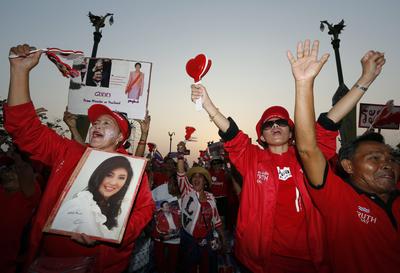Authors: Pasuk Phongpaichit, Chulalongkorn University, and Chris Baker, Bangkok
The courts may shortly remove Thailand’s prime minister, Yingluck Shinawatra.

This would mean that in the past eight years, four prime ministers have been felled and four election results voided — surely a world record.
Behind this turbulence is major social change. Over one generation, average real per capita income tripled. The impact was greatest in the lower half of society. Many migrated for work, becoming aware of the great inequities in Thai society. Remittances flowing back to the village were invested in new urban-style lifestyles and consumption patterns — including access to the world through satellite and internet. Values and aspirations changed in parallel. People began to demand a fairer share of public goods like healthcare and education, and equal benefits. From around 2000, they discovered the power of the vote to realise these aims.
Thailand’s old political institutions — the bureaucracy, military and monarchy — were rattled because they had never faced such assertiveness before. They have won support from an urban middle class nervous about being a minority in an electoral democracy, and reluctant to see their taxes used to share national resources more equitably.
This classic social clash has been complicated by personalities. Thaksin Shinawatra, the first politician to respond to the upsurge from below, lacked any ethical hesitation about using power to increase his personal wealth. The moral aura of the monarch, King Bhumibol Adulyadej, enhanced by his seniority and the length of his reign, was invoked as a counter to the power of popular politicians.
The establishment tried to get rid of Thaksin by a coup in 2006. This classic manoeuvre failed because of the social forces behind him. Thaksin’s party rose from the ashes after two dissolutions. The electorate supported him through three more polls. And from exile, Thaksin continued to rally his supporters through new electronic media.
The establishment then changed the rules of politics — reducing the power of the parliament and executive, reviving the political role of the military, and handing a new role to the judiciary. But this again did not fully work, and a Thaksinite party swept back to power in 2011.
Opponents immediately began trying to bring this Yingluck government down — seeking a moratorium on parliament while the rules were changed yet again. Thaksin’s opponents argue that simple electoral democracy has to be qualified to prevent abuse of power — best done by strengthening old institutions, privileges and hierarchies.
Against them, the pro-Thaksin Red Shirts want to protect electoral democracy as a means to do away with those old privileges and hierarchies.
The present phase of protest began in November 2013 after a botched attempt to pass an amnesty bill that would have whitewashed Thaksin, and enabled him to return to Thailand. At first this protest was different from earlier phases. Young office workers mobilised over social media and assembled in mobs over lunch hour or on weekends at hubs of Bangkok’s mass transit system. Their anger was focussed on Thaksin’s manipulation of the parliament for personal ends.
Within weeks, the opposition Democrat Party muscled into the protests’ leadership, changed its aim to overthrowing the government, set up elaborate protest venues at very high expense, and disrupted a general election. The young protesters melted away, leaving a sparse crowd dominated by supporters from the Democrat stronghold in the south and 4000 ‘guards’ paid USD$15 a day.
The protesters called on the army or the palace to remove the government. The palace kept its silence. The army chief bluntly refused. He explained that the 2006 coup had not really ‘worked’, and was clearly sensitive about international censure.
The opposition turned to the judiciary as an alternative mechanism. Ten years ago, Thailand’s judiciary had a negligible political role. Now the judges topple governments, remove ministers, void elections, and issue instructions to governments on what they can and cannot do.
What happens next is far from clear. In the short term, judicial rulings will probably bring down the government, followed by a new election and a package of reforms. Reforms may include changes in the form of elections, improved mechanisms for monitoring the budget, and a reconstituted senate.
Over the longer term, the forces in play will not remain static. Thaksin can probably never return to an active political role. Yingluck may also be neutralised, and the family has no other promising candidates. A succession in the monarchy is looming. So, with a change in personalities, the pieces of the political jigsaw will start to shift.
The social and economic changes underlying politics will continue. The fastest growing areas are now outside the capital, particularly in the north and northeast. Upper secondary and tertiary education will expand in the provinces. Media will continue to develop, while decentralisation also advances.
All these trends will tend to strengthen the forces pressing for a redistribution of social and economic power. The establishment resisting these changes will ultimately be obliged to compromise — and the political system will catch up with economic and social change.
Pasuk Phongpaichit is Professor of Economics at Chulalongkorn University, Bangkok.
Chris Baker is a historian and prominent Thailand scholar.





















